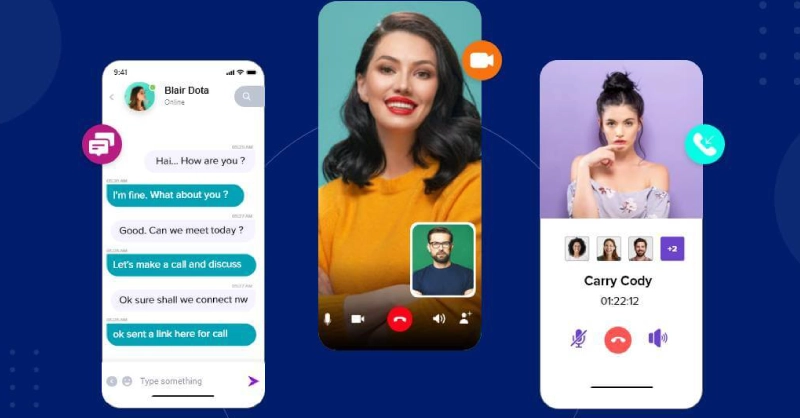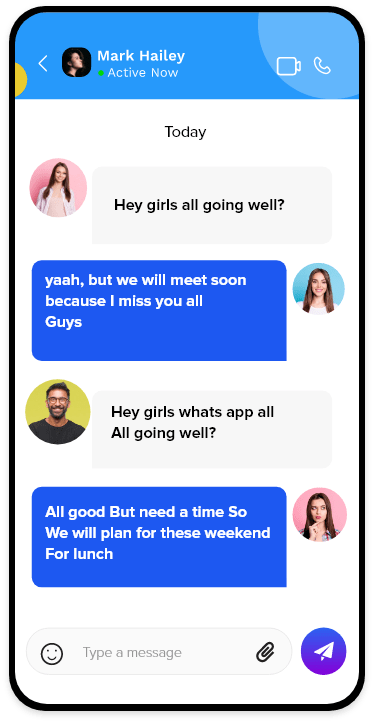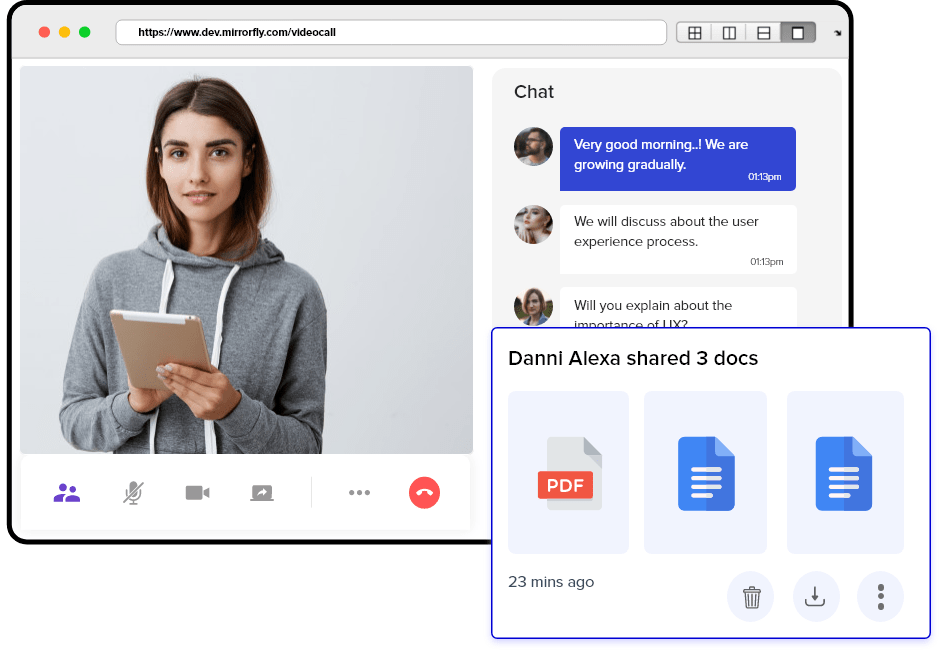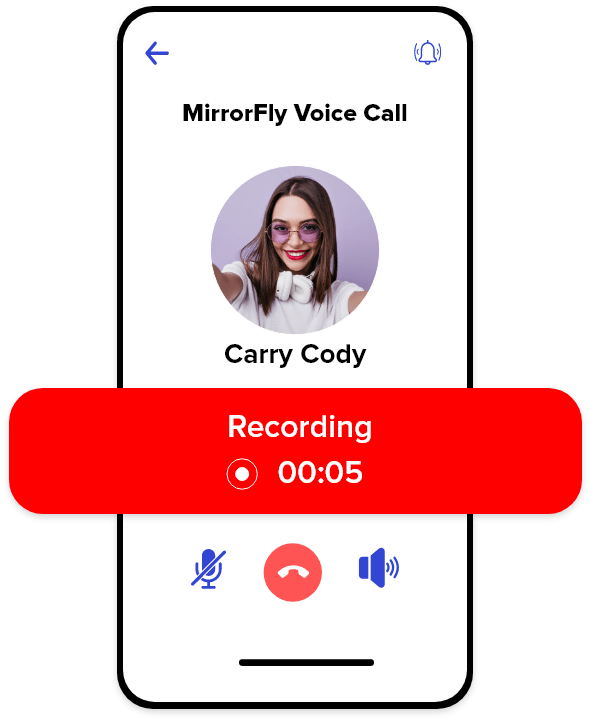How To Build a Real Time Chat App for iOS and Android?

In today’s digital era, real-time communication has become the backbone of immediate connectivity. Whether it is to connect with friends or families or provide quick customer support, instant messaging platforms are on the rise.
Specifically, messenger apps like WhatsApp that are being used by 2 billion users monthly. Considering there is real business in this field, several brands are building real-time chat apps for iOS and Android to create engaging experiences.
But where to start? Here, in this guide. Yes, we will see the detailed process of building your real-time chat app, help you choose the right framework and development tool, and much more to make your chat app functional and responsive.
Table of Contents
What is a Real-time Chat Application?
A realtime chat app is a software application that provides instant and responsive P2P communication experiences. These apps enable messages to be delivered instantly to recipients, once they are sent without any significant delays.
Plus, real-time chat apps are most commonly used for team collaboration, personal communication, and for contact center support.
How To Build Real Time Chat App?
If you are curious to learn how to build your own real-time chat app for your business, check out the two variations I’ve listed below.
You’ve got 2 options:
Step 1: Build a Messaging App from Scratch
When you decide to build your own chat app, you must remember that the margin is very high. You must cater to all the needs of users, add exquisite features, and make it the most secure.
Plus, you would need high capital for development, hosting, and infrastructure. And this option would eat up your time to build a simple feature.
That’s why developers often prefer the next option.
Step 2: Integrate Pre-built APIs and SDKs
Integrating secure chat APIs is the easiest way to add messaging features into your apps within a matter of minutes. All you need to do is just create an account with trustworthy providers like MirrorFly, download their SDKs, and integrate them into your apps. Easy right? Well, let me take you through the steps it takes to build chat app:
1: Create an account with MirrorFly
3: Download the SDKs you need for you Android, iOS or web apps
4: Initialize the SDKs by following API documentation
5: Add the codes for sending messages, and then to receive messages.
6: Include codes for features like building chat rooms and moderation controls
7: Connect your app and the SDK to the MirrorFly server to enable the exchange of chat messages across user devices
8: Deploy your appThat’s it! You’ve done it all in the minimal time possible. Now, the next focus is on.
Must-have Features In A Real Time Messaging App?
The real-time chat services are usually built with a combination of unique features and functionalities. And so, it is their top-notch features that indicate an app’s growth and success in the market.
Thus, let’s have a look at some of the most popular chat app features.
1. Video Calling & Video Conferencing
A real time chat app without video calling and video conferencing features is something unimaginable.
As the presence of these two capabilities would allow users to engage in a one-on-one video chat or group video calls, regardless of their geographical location.
Plus, integrating these features into chat apps can promote collaboration, communication, and engagement.

2. One-to-one and Group Chat
Let your users connect with their peers or with multiple members of a team via one-on-one private chats or group chats.
Also, with additional features like emojis, file sharing, online chat rooms, and push notifications, make communication more easy and more effective.

3. On-cloud & On-premise Hosting
These are the two options for hosting your chat app infrastructure.
While in the on-cloud hosting model, your entire chat app can be hosted on our cloud servers or any third-party cloud providers like AWS, GCP, and Azure.
These providers will look after the scalability, security, and maintenance processes. But, you will be devoid of any control or ownership. Customizing security is difficult.
Whereas, hosting apps on your own premises can give you complete control over data and security, and give you endless customization options. Plus, this model even allows you to configure and maintain the servers as per your business needs.
4. End -to End Encryption
Security is a major concern for any messaging platform.
Therefore, to ensure the highest degree of confidentiality, many chat SDKs are built with E2E encryption protocols that secures every conversation happening over the internet.
In this process, the data is encrypted at the sender’s end and will be automatically decrypted on the receiver’s side thus protecting content from prying eyes.

5. Multimedia Support (File and Image)
Alongside the video, voice, and chat capabilities that many chat platforms or apps offer, multimedia support is the most sought-after requirement by businesses.
Always go ahead with a chat SDK provider who offers file and image-sharing features, as these are known to enhance communication.
Plus, the presence of emojis, GIFs, and graphics can foster dynamic interactions.

6. VoIP/SIP Calling
The main purpose of these VoIP/SIP calling features is to replace your traditional business phone lines.
While VoIP helps the transmission of voice signals over the internet by converting them into digital packets, SIP on the other hand, manages communication sessions between users.
Thus, both protocols stand as a reliable alternative to traditional phone lines.
7. Voice Calling and Recording
Voice calling and voice recording are some of the best real-time communication features to see in an instant messaging platform, as they connect businesses in the most cost-effective manner.
They allow you to contact and interact with people in real-time wherein you can record the conversations and have them stored for your future reference.

8. Cross Platform Calling and Call Queuing
Everybody appreciates an app when it is available as an easy-to-use service. Cross-platform calling allows you to make and receive high-quality voice calls across any platform, desktop, mobile app, or carrier network anytime in realtime. With the call queuing feature, the call will automatically get into the queue until the agent gets free to attend the next call.
9. In-app purchase and Monetization
What if you have been given the option to buy the specific features that your app desires – sounds great, right?
This is what in-app purchase does, it lets users access special content within the chat app by paying a specific fee.
And as we speak about monetization, there are many models.
All of which assist businesses to reach out to customers in a direct way that eventually increases the conversion rate by 150% more than the conventional.
For instance, in-app chat advertisements, social media ads, pay-per-download, sponsorship, premium customer service, etc.
10. Chat Analytics
Chat analytics helps businesses or brands to gain insights on data points within a messaging app. These data points can include response times, user engagement, message volume, and more.
Plus, having this information in hand can help businesses boost customer service, improve engagements, and elevate UXs.
Now, after a brief discussion about the essential features that a realtime chat app should have. Let’s move on to its technical part, the backend picture.

List Of Tech Stacks That Create Robust Chat Apps
Have you ever noticed how these real time chat apps are so perfect with their functionalities? Well, it’s the technical stack that plays the key role.
Yes! They work so silently in the back to make a real-time chat platform the best.
Therefore, we will explore some of the varieties in the tech stack and have a better understanding.

1. Erlang
Erlang, created by Ericsson, is a powerful programming language commonly used to create robust real-time chat applications.
Additionally, Erlang is well-suited for building scalable telecom and fintech applications because of its native capabilities.
And being lightweight in nature, the language has made adding message passing and other real-time features simply easy.
2. Ejabberd
Ejabberd is an open-source XMPP messaging server that is developed in Erlang to build robust real-time chat apps.
Plus, the apps built using this programming language are known to be highly performing, reliable, and extensible.
Some of the most common features that can be developed with Ejabber’s pluggable modules include:
- One-on-one chat
- Personal Event Protocol (PEP)
- Message typing specification
- Privacy setting and account spoofing
- Message Archive Management (MAM), and much more.
3. FreeBSD
This is a free and open-source UNIX-like operating system.
Its functionality is very much similar to Linux with major differences lying in scope and licensing.
Another positive aspect of this tech stack is that WhatsApp, which is known to send billions of messages daily without any glitches, is built using FreeBSD.
4. YAWS
The YAWS (Yet Another Web Server) programming language is fully written on Erlang, and so, is suitable to build scalable apps.
Plus, YAWS is highly customizable and its support for various protocols like HTTP, HTTPS, and WebSocket, makes it an ideal choice for developers to create real-time apps.
Just not these, YAWS system is also capable enough to handle concurrent processes in an efficient way without compromising on performance.
5. Lighttpd
Lighttpd, also spelled as Lighty, is an open-source web server that is designed to handle high-traffic websites & apps, and concurrent connections.
Plus, the tech stack has a small memory but great performance capability that has been helping developers build reliable and lightweight web solutions.
Recommended Reading
6. Php
PHP is widely recognized as a popular programming language that is used to build websites. And an added benefit of it is that it is free to use.
Proof of the above is the launch of several personal blogs and corporate websites that have used PHP with HTML.
Additionally, PHP supports various databases like MySQL, PostgreSQL, and SQLite, all of which are helpful to build dynamic web apps.
7. BEAM
BEAM is part of the Erlang Run-Time System (ERTS), meaning, it compiles the Erlang source code into bytecode in quick seconds.
Which is then executed on the BEAM virtual machine.
Plus, the language comes packed with multiple pre-built functions like a network interface tool.
This interface tool is known to enhance the functionality of chat apps through schedulers, message passing, and memory management.
8. XMPP Server
An XMPP(Extensible Messaging and Presence Protocol) server is a type of application or software technology that promotes real-time chats with the help of XMPP protocol.
Additionally, it supports instant messaging, chat services, presence, and collaboration features in multiple platforms and devices.
Above these, one of the key advantages of an XMPP server is that it can be deployed on any environment, be it a cloud infrastructure, public internet, or enterprise network.
Along with this, developers too can integrate them with other systems using XMPP extensions (XEPs).
9. HTML WebSocket
The WebSocket is one of the reliable real-time communication protocols that facilitates persistent and bi-drectional communication between web servers and browsers.
And unlike HTTP protocol, WebSocket uses TCP connection to enable data exchange through continuous polling.
10. Mnesia DB
This is a realtime database management system that is written in the Erlang language.
Since it’s a soft database, it permits the storage of messages, images, files, voice/video files, documents, GIFs, etc., on your real time chat application.
This is the most forwarded technology that works beyond one’s expectations and has the capability to store any amount of data.
So these are some of the majorly used technologies or tech stacks to build real time chat apps. Now, let’s see how impactful such apps can be for businesses.
How Does A Realtime Chat App Benefit Businesses?
A real-time chat app is like a savior for many small and medium-sized businesses in offering numerous benefits to enhance communication and collaboration.
And of course, brands or developers can bring the global connection to the table by building a real time chat app for an enterprise.
Therefore, let’s see some of the benefits of real-time chat applications for businesses.
1. Improves Collaboration
Real-time chat apps can facilitate productive teamwork through seamless communication capabilities like 1-on-1 chats, group video calls, file sharing, push notifications, and more.
These features help promote better coordination between team members and alleviate product hassles.

2. Boosts Work Ethics
This benefit explains the professionalism employees can experience on using a messaging platform.
Not only does the app give transparency on tasks pending and covered, but it also keeps employees notified by tagging them.
3. Strengthens Productivity
Using a real-time communication solution in the workplace can help employees quickly get their issues resolved, collaborate with their peers on tasks, and meet deadlines.
Thus, streamlining the work procedure and helping them stay productive at all times.
4. Reduces Cost
Imagine the cost and time it would take when businesses use phone calls to discuss meetings or resolve issues.
Unimaginably high, and that’s where real-time chat services help reduce the overall cost by bringing in communication and collaboration features in a single platform.
5. Different Hosting Models
This could be said as one of the prime benefits of using a real-time chat app – hosting model. Yes, some of the applications provide on-cloud and on-premise hosting solutions based on business requirements.
Though both models are secure, the on-premise chat solution helps brands customize security, and features, and build a whitelabeled messenger app.
6. High-end Automated Recording
The final one on the list is the advanced features that real-time chat apps offer- recording and archiving conversations.
This recording capability can help businesses track compliance and quality assurance parameters in call centers.
Plus, analyze data for employee improvement purposes.
The above are some of the major contributions that the real-time chat app provides to any enterprise.
Wrapping Up!
For now, I hope you would have got a clear understanding of how to make a messaging app for Android or web apps, with features, functionalities, and tech stacks.
Now, it’s up to you to decide what and all things you require to create your real time chat app for iOS , android from the above-mentioned listings. But, if you still feel you need more guidance concerning the same then feel free to book a demo with us, we are here to assist you.
Good Luck!
Ready To Build Your Own Custom Chat App?
Get our enterprise-grade communication solution, that can be set up on your company servers.
Request Demo100% customizable
White-label solution
Full source code

Frequently Asked Questions (FAQ)
WebRTC and Websockets are widely used in order to make a real-time chat app. To create a real-time chat app, you have to decide whether you’ll build it from scratch or use a pre-built messaging SKD. If you choose to go with the easy method, then follow the simple steps. 1. Download the SDK from the provider. 2. Integrate the real-time chat features and functionalities. 3. Connect your app to the provider’s server or host on-premise and start chatting
An example of real time chat is a conversation you have with a friend over messaging apps like Whatsapp or Slack. These apps let you communicate with others in real time via features like direct messaging and group messaging.
Building a chat app requires a combination of various tech stacks, such as those mentioned below. Frontend: React, Angular, VueJs, React Native, etc. Backend: Javascript, Node.JS, Python, Ruby, etc. Mobile apps: Kotlin, Swift, etc. Real-time engine: Websocket, WebRTC, etc. Database: MySQL, NoSQL, etc. Multiplatform: React, Flutter, React Native, Angular, etc. Hosting: AWS, Oracle, Azure, etc.
Here are a few of the real-time chat apps built using Flutter that are mentioned below. Whatsapp-clone flutter Chatter app MirrorFly API ApphiTect SDK Flutter-chat V_chat_SDK
A real-time chat API is a set of functions and procedures that acts as an interface between your app’s backend and the server infrastructure. This interface is responsible for embedding real-time messaging capabilities into your apps.
Yes. MirrorFly offers lifetime free chat SDK that comes with 150+ messaging features, 99.999% uptime SLA and an average response time below 100ms.
In a real-time messaging app, the client applications (such as web or mobile apps) communicate with the server using WebSocket or Socket.io. When a user sends a message, it is transmitted to the server and then the message is sent to the other client connected to it. The client receives the message in real-time and is displayed on the UI of the user.
Related Articles:
- How to Build a Successful Consultation App?
- 10 Best Instant Messaging Platforms for Business 2023 | MirrorFly
- Why Should You Develop Your Chat App With Flutter?
- How to Build A Custom Chat Platform: A Full Guide [2024]
hey,
how about the key features that a real-time chat solution should have for a great user experience?
Hello Kelvin,
For an optimal user experience, a real-time chat solution should prioritize quick message delivery, multimedia support, end-to-end encryption, cross-device synchronization, intuitive interface, customizable notifications, presence indicators, searchable message history, and reliable customer support. These features ensure seamless communication and enhance user engagement.
hello team,
this article was good, I’m concerned about the security of a real-time chat app. How can I ensure that the messages are secure and cannot be intercepted by malicious actors?
Hi Aswakowda,
we are pleasure to explain you thank you for your queries, Ensuring message security involves implementing end-to-end encryption, where only the communicating users can decipher the messages. Use robust encryption protocols like AES or RSA, secure data transmission via SSL/TLS, regular security audits, strong authentication methods, and secure storage practices. Regular updates and patches help mitigate vulnerabilities, ensuring a more secure messaging environment.
Hi,
Nice article could you clear me that how can I monetize a real-time messaging application once I’ve built it?
hello Senjiv,
Monetizing a real-time messaging app can be done through various avenues. Consider offering premium features like extended storage, enhanced customization, or advanced security for a subscription fee. In-app purchases for stickers, themes, or unique emojis can attract users. Advertising through targeted banners or sponsored content is another option. Additionally, you can provide enterprise solutions or APIs for businesses requiring communication tools, offering subscription-based models or pay-per-use services, diversifying revenue streams for sustained profitability.
This is such nice topic! I’ve always wanted to build a real-time chat app for iOS and Android. Can you provide some guidance on the technologies or frameworks to use for this project?
hi Egmeren,
Certainly! For real-time messaging, consider using WebSocket for instant data transfer. Frameworks like Socket.IO or SignalR offer efficient WebSocket implementations. For app development, React Native or Flutter provide cross-platform compatibility. Backend systems can leverage Node.js, Django, or Firebase for scalability and real-time functionality.
Could you clear me that Which kind of technologies are commonly used to build real-time chat apps?
Commonly used technologies for building real-time chat apps include Firebase for real-time databases, WebSocket for bidirectional communication, and frameworks like React Native or Flutter for cross-platform development, alongside various programming languages.
Hi,
I just went through your article that was pretty nice, here I have a doubt that How do I ensure real-time functionality? if possible explain me it might be helpfull.
To ensure real-time functionality in your chat app, you should focus on these key elements:
Use a Real-Time Database: Employ a real-time database like Firebase or implement WebSockets to instantly update and synchronize data across all clients.
Optimize Network Efficiency: Minimize data transfer by sending only relevant updates and use efficient data structures to reduce latency.
Push Notifications: Implement push notifications to alert users about new messages or updates, even when the app is in the background.
Server-Side Scaling: Ensure your server infrastructure can handle the real-time demands of your app by scaling resources as needed.
Client-Side Responsiveness: Use asynchronous programming techniques to keep the user interface responsive and prevent freezing during data updates.
I think this is one of the best article about building android & ios real-time messaging app that I’m looking for. Thanks for sharing this article.
Hi Dev,
Thank you for your complement.
Thanks. I found a some good ideas in your article and building the awesome realtime chat solution for both iOS & Android mobile app.
Your article helped me a lot, is there any more related content? Thanks!
Yes Konto,
You can check with our blog hope you can find some more useful topics as you expected. you can free to contact us.